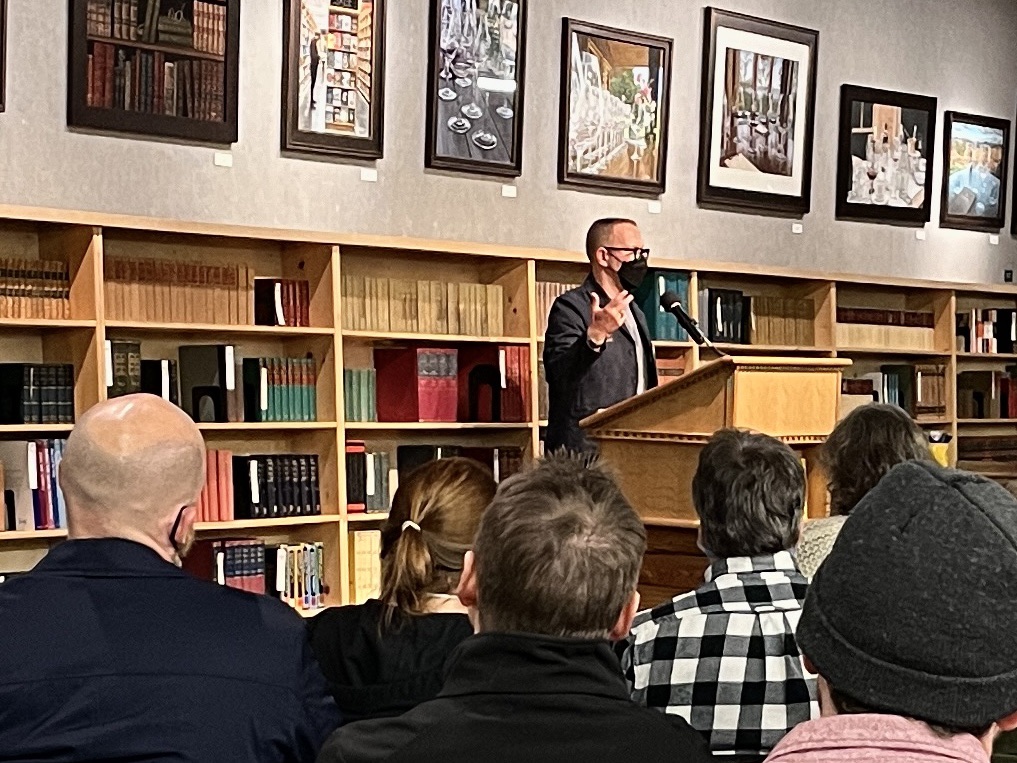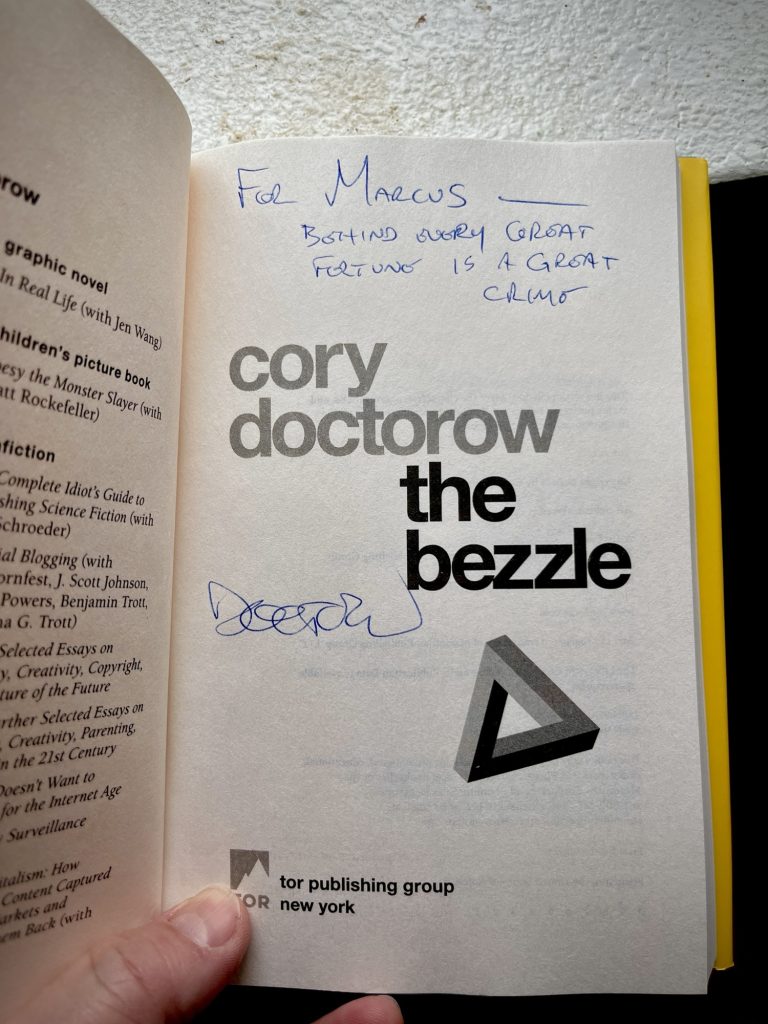In late fall of 2023, I decided to focus on finishing the task I’d started late the year before and abandoned: a close reading of Lord of the Rings. Previously, I’d read in chunks and in referenced fits. That is, I’d see a video or read a friend’s text about some LotR aspect and want to look it up, and in a fit of compulsion, web search the item and go down a rabbit hole of linked references. Occasionally, I’d even read the passage in the book.
But a close re-read, one where I’d try to savor Tolkien’s rich words and vivid imagery, well, my scattered internet-honed senses kept putting that off. It was finding Andy Serkis’s lovely, orotund narration that got me to knuckle under and commit to the project. Part of this reading was by audiobook, part by ebook, and part by my crackling copy of the all-in-one Red Book of Westmarch: the Houghton-Mifflin monster that shouldered aside the fractured trilogies next to it on the Tolkien shelf.
I highlighted a number of passages as I went, some just for me and a few that I thought were more generally relevant. One thing made more clear this time was that elves are not so aloof or haughty as they’re often made out to be. They can be plenty lighthearted, but as immortals, and mostly hundreds to thousands of years old, they probably have few surprises left out there in the world.
‘And it is also said,’ answered Frodo: ‘Go not to the Elves for counsel, for they will say both no and yes.’
‘Is it indeed?’ laughed Gildor. ‘Elves seldom give unguarded advice, for advice is a dangerous gift, even from the wise to the wise, and all courses may run ill.’
~ The Lord of the Rings, Bk. 1, Ch. 3
Frodo is honestly a little bitchy here, but Gildor takes it in stride. Legolas does the same quite a few times for Gimli, who wears his bigotry on his sleeve until he’s forced to confront it because Legolas just decided he wanted a grumpy hothead for a pal.
And this reading deepened my affection for Legolas. My mother was a Tolkien fan almost from the time Lord of the Rings was published, and she collected his other works as they were methodically released. Legolas was her favorite character, and I finally have a better understanding why, now. He’s unfailingly kind and steadfast. He’s thoughtful and a supportive friend. He’s cultured and wise, too.
Legolas stirred in his boat. ‘Nay, time does not tarry ever,’ he said; ‘but change and growth is not in all things and places alike. For the Elves the world moves, and it moves both very swift and very slow. Swift, because they themselves change little, and all else fleets by: it is a grief to them. Slow, because they need not count the running years, not for themselves. The passing seasons are but ripples ever repeated in the long long stream. Yet beneath the Sun all things must wear to an end at last.”
~ ibid., Bk. 2, Ch. 9
How could I not appreciate such incisive cultural self-analysis? That’s trenchant, that is.
The slogging point was the same: most of Books 3 and 4, The Two Towers, the middle of the middle. But I had a better time having decided to read slowly this go-round, and even when it felt endless, Tolkien’s skill at describing his world just grew and grew. I gained a better sense of who Sméagol really was, and new admiration for Faramir.
‘Not if I found it on the highway would I take it I said. Even if I were such a man as to desire this thing, and even though I knew not clearly what this thing was when I spoke, still I should take those words as a vow, and be held by them.’
~ ibid., Bk. 4, Ch. 5
I lost all hesitation when I got to that point, where Sam and Frodo leave Faramir and his men at Henneth Annûn, reunite with Sméagol, and start the final leg of the journey to Mt. Doom. It was hard not to hurry from there to the end.
I’d forgotten how much we get to understand Sam, and how wise HE became through the story—one of the farthest and richest arcs any of the characters experienced, if not the biggest. It’s honestly a comfort (and a joy) to be with him as Frodo begins to wither under the weight of The Ring, his wounds, and his tortured sense of responsibility. Sam lends us strength of will and spirit even as he does the same for Frodo.
From the long climb up the mountain stair through the horrors of Shelob and the nastiness of the orcs of Cirith Ungol, Sam keeps his head (mostly) and keeps his loyalty front and center. And we get meta narrative gems like this:
‘I used to think that they were things the wonderful folk of the stories went out and looked for, because they wanted them, because they were exciting and life was a bit dull, a kind of a sport, as you might say. But that’s not the way of it with the tales that really mattered, or the ones that stay in the mind. Folk seem to have been just landed in them, usually – their paths were laid that way, as you put it. But I expect they had lots of chances, like us, of turning back, only they didn’t. And if they had, we shouldn’t know, because they’d have been forgotten.’
~ ibid., Bk. 4, Ch. 8
For all the joking that’s been done about having the eagles take The Ring straight to the volcano and be done with it—and whether it would or wouldn’t have worked—I bet Gwaihir would’ve tried if Gandalf had asked him sincerely. I’m more inclined to believe that now, in light of the passage that stirred me most in LotR this time, that choked me up a bit. It was the open, unquestioned bond between the Lord of the Eagles and his longtime wizard BFF as the latter asks for help in searching for Frodo and Sam on Mt. Doom’s lava-oozing slopes:
“Twice you have borne me, Gwaihir my friend,’ said Gandalf. ‘Thrice shall pay for all, if you are willing. You will not find me a burden much greater than when you bore me from Zirakzigil, where my old life burned away.’
‘I would bear you,’ answered Gwaihir, ‘whither you will, even were you made of stone.”
~ ibid., Bk. 6, Ch. 4
This was a thoroughly enjoyable re-read, and I’m already thinking about when I might want to do it again. I have a shelf full of unread books (be fair, two shelves), though, so maybe not for a year or two, at least.
Useful References
Two sources helped when I needed to look up people, places, & things. One was my battered, coverless The Complete Guide to Middle-Earth, by Robert Foster. The other—used way more often—was the Tolkien Gateway
My main inspiration to start the journey once more was Adam Roberts’s LotR Re-Read, which he documents vastly more than I’ve cared to do here, with references to other criticism and analysis in 6 parts, one for each “book” Tolkien split LotR into.
The algorithms handed me a ton of Tolkien-related videos once I’d looked up a couple things. Herewith, some favorites I came across in my recommendations:
Top 10 Middle Earth Misconceptions – Tolkien Untangled
Why Lord of the Rings LIES to you — Tolkien’s unreliable narrator
Tolkien’s Incredible Map of Middle-Earth – Mapster
Why couldn’t Sauron sense Bilbo? – In Deep Geek
Tolkien’s unpublished Epilogue to The Lord of the Rings
There’s no way Tolkien was speaking English here




